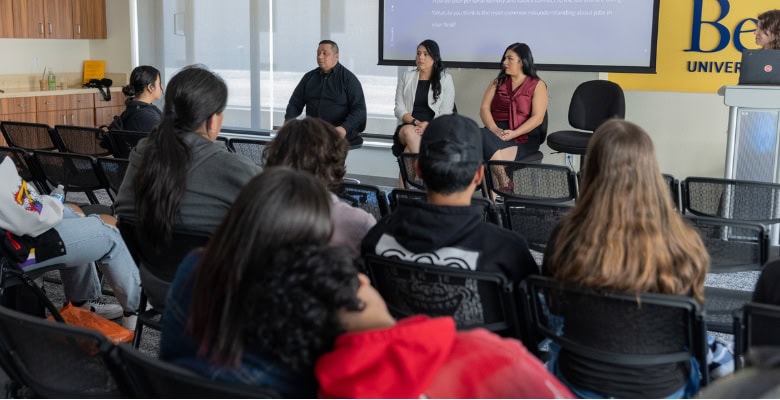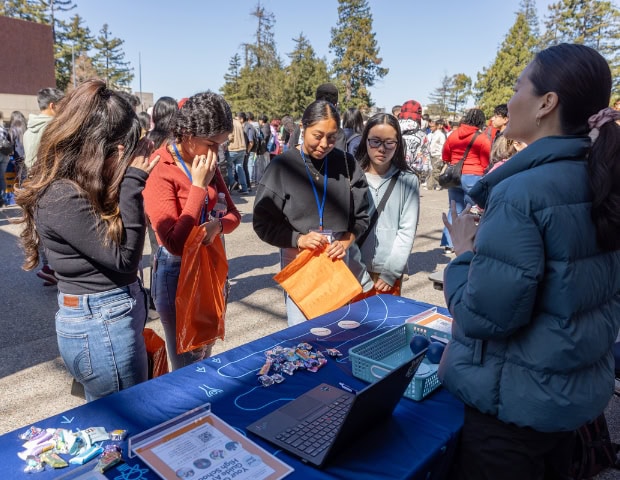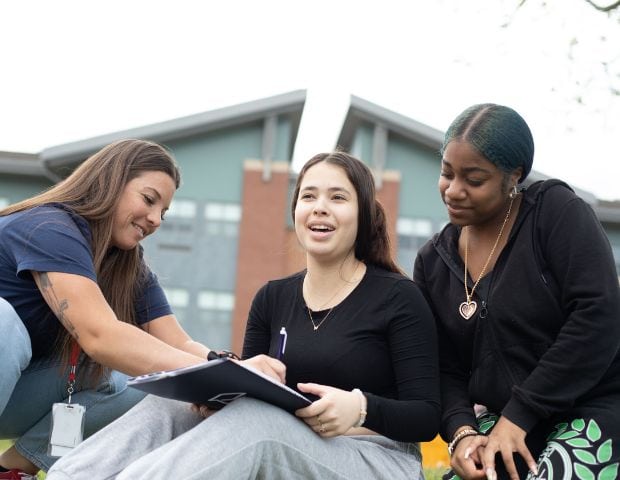College and career readiness is a frequently used metric in schools and in the postsecondary access field. But how is readiness defined? And what steps can schools take to help pave the way?
College and Career Readiness: Parent Resources
By Shelby Ward
April 26, 2024
This blog post will explore resources to involve parents in the decision-making process, fostering a supportive environment for career exploration and college planning.
As high school students navigate the pivotal years leading up to graduation, the role of parents in supporting their college and career readiness becomes increasingly crucial. From understanding the complexities of the college application process to exploring various career pathways, parents serve as invaluable guides and advocates for their children’s future success. In this blog post, we’ll delve into essential resources and strategies that empower parents to actively engage in their child’s educational journey, equipping them with the knowledge and tools necessary to navigate the intricate landscape of college and career readiness effectively. Whether it’s fostering a college-going mindset or facilitating exploration of progressive pathway opportunities, parents play a pivotal role in shaping their child’s postsecondary aspirations.
Helping students through this difficult transition can be intimidating for parents, especially for those who never attended college. By reading this post, parents will be empowered to support their students throughout their postsecondary pathways with resources and information.

Importance of Parental Involvement
Teachers and other school staff are a great resource for students at school. However, students do not spend all of their time at school or with the same teacher. While students do often form meaningful relationships with teachers and other staff, it is difficult for any teacher at a school to get a full understanding of the students’ likes and dislikes and their strengths and challenges. Parents have spent a lifetime getting to know their children and will have a better understanding of what support and guidance their child may need in postsecondary education.
Parents also have the benefit of being able to devote more time to their child than a teacher has to support one individual student. Teachers have many students and it is nearly impossible for them to dedicate enough time for the conversations that students need to have to determine their postsecondary pathway. In addition, conversations with parents can be held in much more casual environments. Parents can discuss students’ plans during meal times, errands, or family activities. Parents have much more access to their students than teachers often do.
Finally, parents will still be present when the student graduates from secondary school. While teachers may stay in contact with former students, it becomes much more difficult once the student is no longer on campus daily. Students need support during their postsecondary pathway, especially during the first year. By being present during this transition, parents can ensure that their child is successful on their postsecondary journey.
Building a Supportive Environment
Conversations about the future can be intimidating to students, so it is important to start with more casual conversations. Parents can ask questions such as, “I noticed you really enjoyed learning about diseases in chemistry. Is that something you might want to do in the future?” or “I saw that you can choose an elective this year. Are you going to choose one that might interest you as a future career?” The depth and length of the conversation is not always important, but the frequency and honesty is! Starting these conversations early can help students navigate high school schedules to better align with their future plans.

Whenever possible, students should be exposed to various career options. Starting from a young age, parents can show students different jobs. They could go to museums and see exhibits about various disciplines. Even a trip to the store or dentist can be educational if parents are willing to talk to their children about the careers that they encounter. Parents should also share their own experiences with their own careers. They should be honest about what they love and don’t love about their chosen career. Parents can arrange for friends and family to discuss their careers with their children as well, especially if it is something that the child is interested in pursuing.
Parents should also be open and honest about their abilities to financially support their child during postsecondary education. These conversations should happen as early as possible to help the student prepare for the cost of their postsecondary journey. By having this conversation early, the student may be able to take advantage of different programs while still in high school. For example, one student’s parents informed her that they could not afford tuition, but that they would provide a place to live and food to eat while she was in college. Because the student knew this early in her high school journey, she was able to investigate different options for funding and ultimately joined ROTC to pay for her college. She would not have had as many opportunities had she waited until senior year. Students can also examine progressive pathways to help fund their postsecondary journey.
By fostering a supportive environment, parents will find their child more willing to open up and share their desires for the future.
College and Career Online Resources for Parents:
Here are some tools and resources parents can use to support their child on their postsecondary path.
Khan Academy is a free site that provides practice for the SAT, ACT, AP courses, and other high school subjects. Khan Academy uses videos, articles, and exercises to review various concepts. It is a fantastic resource for students who may need a little extra support preparing for their exams. Parents can also view the courses if they wish to refresh their own knowledge to support their students.
BigFuture is a college and career exploration resource developed by CollegeBoard (the same company that creates the SAT). Students and parents can explore various career options based on interests.
Federal Student Aid’s website provides information directly from the U.S. Department of Education. Parents and students can view career exploration information as well as apply for federal aid (FAFSA) during a student’s senior year. Most colleges require students to complete the FAFSA before they will offer financial aid to students.

Interactive Workshops and Webinars
Oftentimes, supporting students through such a monumental change in life can be daunting for parents, especially if it is their first time. Schools can alleviate some of this pressure by hosting interactive college and career workshops and webinars, allowing parents to take advantage of the expertise and resources available through the school.
Some ideas for workshops include:
FAFSA
Schools can host a FAFSA workshop after work hours where counselors can assist students and parents in completing their FAFSA. This federal aid application is vital for students to complete, but they must have their parents fill out a portion of the form. By hosting a workshop, counselors can help both the student and the parent complete their sections and submit the FAFSA.
Career Exploration Fairs
Career exploration fairs do not need to be relegated to school hours! Schools could invite people from the community to an event after school where parents and students can explore career opportunities together. This is an excellent opportunity to foster conversations between parents and students about potential postsecondary pathways.

College Fairs
Just like a career exploration fair, schools could host colleges after school or on the weekends so that parents can meet with representatives from colleges and ask questions about their programs and financial costs. This will make it easier for parents to discuss future financial support with their students.
Question and Answer Sessions
Schools could host a night for parents to come and ask questions of the school staff about college and career readiness. The school could take live questions, ask for submissions in advance, or take a mixed approach. The benefit of such a night would be that parents may get answers to questions they did not even know they had.
Parent-Teacher Collaboration
Students spend eight or more hours a day at school. They see their teachers at least 3 hours a week. This is a significant amount of time that students are not with their parents. Because of this, it is vital that parents and teachers collaborate to ensure that their students are getting all the support they need.
Parents should communicate concerns with teachers and be receptive when teachers communicate their concerns as well. Remember, this is a collaboration! Both parents and teachers want the same thing: the success of their student!
Online Tools for Parent-Teacher Collaboration
TalkingPoints is a tool that facilitates communication between parents and teachers. It allows teachers to broadcast mass messages and allows parents and teachers to communicate one-on-one as well. The major benefit of TalkingPoints is that it will translate messages so parents and teachers can communicate despite language difference.
Google Sites is a free website building software from Google. Teachers can set up a website for their class that showcases various activities from class as well as important announcements regarding their college and career activities. Students can create their own website to showcase their assignments. Having one place with all the information makes it easier for teachers to share content with parents. For example, teachers can share what students are learning as well as connections to careers, allowing parents to have conversations about what their child is learning.
Google Forms allows teachers to create a survey for parents to complete about their child’s interests. Students should also complete their own survey. Teachers can use this information to showcase careers within their subjects that their students might like. They can answer that favorite question, “When will I ever use this?”
Teachers can further support parents by sharing the resources and information found in this blog post.

By using the resources and information in this blog, parents can feel empowered to foster success in their students’ futures. Parents must remember to communicate with their children and support them in their postsecondary endeavors.
Shelby Ward was born and raised in Spokane, Washington. She received her BA in history teaching from Brigham Young University in Provo, Utah, where she had the opportunity to move to Houston for a three-month internship. Despite experiencing her first hurricane 10 days after moving in, Shelby never left and is now a OneGoal Program Director in Houston.

Related Stories
This blog post explores effective strategies and insights to inspire and support students in pursuing and persisting on their postsecondary path.
Schools across the country want to emphasize college and career readiness on their campuses. In this blog post we will share some creative ways to get students excited about postsecondary choices!





